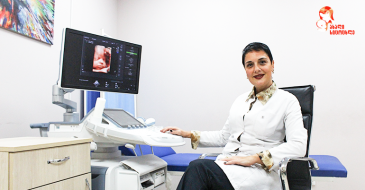Menopause or climacteric period in essence does not represent a disease or disease complex and it is a physiological stage of a woman's life.
The word "menopause" implies complete disappearance of menstruation and termination of female fertility. If menopause painlessly progresses in one woman’s life, second one may need some help to handle menopause's physical and psychological manifestations.
The head of obstetrics and gynecology department at National Center of Surgery, Mindia Iobashvili discusses menopause and climacteric period with us.
– Mr. Iobashvili, what can you tell us about symptoms of menopause?
– Menopause progression is individual for every women. Some have no symptoms but menstruation cycle termination. Most women have many complaints characterizing climacteric period.
Most of the complaints weaken and disappear over time. For example:
- Periodic body hotness, so called “flushes”;
- Night sweats,
- Quick tiredness
- Emotional changes. To be more specific, mood changes and decreased sexual interest. Eeasily irritable;
- Sleep disorder (insomnia);
- Skin and hair dryness;
- Excessive hairiness on face and body;
- Unpleasant feeling, discomfort, occasional joint pains;
- Headache;
- Heart palpitation – fast or irregular heartbeat;
- Skin and outer genital organs’ itchiness
- Emotional lability
It should be noted that some symptoms may prolong:
- Cervical mucus dryness, itchiness, infections, pain during sexual intercourse;
- Symptoms related to urination: weakening urinary retention ability, frequent urinary tract infections.
I will clarify that intensity symptoms depend on different factors, mainly woman's personal characteristics (character) and her living environment.
Studies have shown that women who have family and close friends and/or are fully loaded with work have fewer complaints regarding menopause symptoms. At the same time, women's attitude towards climacteric period as a phenomenon has a significant impact on its progress.
– What kind of hormonal changes begin during menopause?
– Female’s genital glands, ovaries function from adolescents to menopause and this period is called reproductive period.
Once every four weeks in ovaries ripens the follicle that ruptures and releases the egg. At the same time, the follicle generates female’s main sex hormone - estrogen. The yellow body is formed from the ruptured follicle that emits woman's second sex hormone - progesterone. Estrogen causes the growth of cervical mucus in the first phase of the menstrual cycle, whereas, with progesterone’s influence, mucosa undergoes preparation to be receptive to fertilized egg. If the egg is not fertilized, the yellow body regresses. Progesterone level in blood is significantly decreased, followed by the cervical mucus’s shedding and menstruation. Meanwhile, next egg ripens in ovaries and new menstrual cycle begins.
From 30 to 50 years the biological age of ovaries nears the end: the production of hormones decreases, the egg ripens more and more rarely, which expresses itself with irregular menstrual cycles. The function of the ovaries is regulated by the center in the brain, which in response to decreased ovaries’ function, increases its stimulating hormones. For some time, ovary manages to mobilize the last reserve, but ultimately day comes when it stops functioning.
– What can you tell us about average age of menopause’s beginning and which age group is considered to be early?
– According to statistical data, menopause begins from 45 to 55 years old, averagely at 51.
If menopause starts at the age of 40, it is called early menopause and requires regular treatment. The reasons for early menopause are unknown, but some factors play certain role in these processes, such as heritage, smoking and so on.
It is considered delayed if it starts later that at the age of 55. In this case, women need attention and doctor’s surveillance due to high risk of breast cancer.
Ovarian and/or uterine surgical removal causes an immediate start of menopause.
– What influence does hormone deficiency have on urinary bladder, bone and cardiovascular system?
– Estrogen stimulates calcium supplementation in bones. After menopause, estrogen level significantly decreases in blood; the bones impoverish from calcium and develop osteoporosis. Osteoporosis is a systemic disease of bones, which is characterized with bone shedding, increased bone fragility and fractures. Osteoporosis is characterized by a slow pace of bone exhaustion. Its first manifestation is the pain caused by the micro fractures of spinal vertebrae. After this spine shortens and undergoes deformation. Later occurs the most severe form of osteoporosis - femoral fracture. Osteoporosis treatment is a slow and long-term process. Its prophylactic is far more effective, for which we should start caring before the menopause.
Cardiovascular diseases are found in women over 50 years old. The reason is estrogen deficiency. Estrogen facilitates cholesterol fractions formation that does not damage blood vessels, protects blood vessels from aggressive free radicals, widens its lumens and improves blood circulation. During menopause, estrogen deficiency causes a reduction-termination in all these protective mechanisms that leads to women's health worsening.
Urinary incontinence, along with atrophy of urinary bladder and urethra’s muscle and mucous membranes and vascular changes are caused by estrogen deficiency.
In addition to listed pathologies, estrogen deficiency causes uterine prolapse, skin and mucous dryness resulting in wrinkled skin and painful sexual intercourse. Estrogen facilitates synovial fluid generation in joints. Therefore, its deficiency during climacteric period determines joint pain. Recently it became known that Alzheimer's disease is directly related to the level of hormones.
National Center of Surgery address: Tbilisi, Dighomi, Chachava N5..
You may contact National Center of Surgery’s call center at 577 119 119 or 2 02 25 25..
In case of any issues, you may contact head of the obstetrics and gynecology department at National Center of Surgery, Mindia Iobashvili for consultation at 577 11 68 48.
Wish you health!









